| Listing 1 - 10 of 21 | << page >> |
Sort by
|

ISBN: 9780674019270 067401927X 9780674036383 0674036387 Year: 2007 Publisher: Cambridge, Mass. Belknap Press
Abstract | Keywords | Export | Availability | Bookmark
 Loading...
Loading...Choose an application
- Reference Manager
- EndNote
- RefWorks (Direct export to RefWorks)
Breakthroughs in genetics present us with a promise and a predicament. Although most people find at least some forms of genetic engineering disquieting, it is not easy to articulate why. This work explores these and other moral quandaries connected with the quest to perfect ourselves and our children.
Ethics of family. Ethics of sexuality --- Genetic engineering --- eugenetica (eugenese, eugenetiek) --- genetische engineering (manipulatie) --- verbetergeneeskunde (mensverbetering) --- Moral and ethical aspects. --- eugénisme (eugénique) --- génie génétique (ingénierie génétique) --- médecine de l'amélioration (médecine d'amélioration) --- Moral and ethical aspects
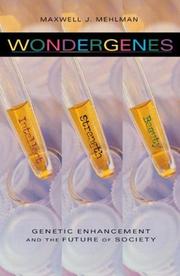
ISBN: 0253342740 Year: 2003 Publisher: Bloomington Indiana university Press
Abstract | Keywords | Export | Availability | Bookmark
 Loading...
Loading...Choose an application
- Reference Manager
- EndNote
- RefWorks (Direct export to RefWorks)
Wondergenes not only imagines a future world in which genetic enhancement is the norm, but asserts that this future has already begun. What happens, for example, when gene therapy becomes gene enhancement? Who will benefit and who might be left behind? What are the costs to our values and beliefs, and to our future? To answer these questions, Mehlman provides an overview of the scientific advances that have led to the present state of genetic enhancement and explains how these advances could be used in the future to redefine what we think of as a normal human being. He explores the ethical dilemmas already facing researchers and medical practitioners - the dilemmas we all will be expected to face - and weighs the social and economic costs of the many proposals to regulate or limit genetic engineering.
Genetic engineering --- Medical genetics --- Social aspects. --- genetische engineering (manipulatie) --- verbetergeneeskunde (mensverbetering) --- ethiek (ethische aspecten) --- genetica (genen) --- génie génétique (ingénierie génétique) --- médecine de l'amélioration (médecine d'amélioration) --- ethique (aspects ethiques) --- génétique (gènes) --- Social aspects
Book
ISBN: 9010021246 Year: 1978 Publisher: Amsterdam Elsevier
Abstract | Keywords | Export | Availability | Bookmark
 Loading...
Loading...Choose an application
- Reference Manager
- EndNote
- RefWorks (Direct export to RefWorks)
biotechnologie --- genetische manipulatie --- bioengineering --- Biotechnology --- #GBIB:CBMER --- 575:159.9 --- gedragswetenschappen --- gedrag, gedragsonderzoek (gedragscontrole, gedragswijziging) --- verbetergeneeskunde (mensverbetering) --- sociaal-politieke aspecten --- ethiek (ethische aspecten) --- sciences du comportement --- contrôle du comportement (modification du comportement) --- médecine de l'amélioration (médecine d'amélioration) --- aspects socio-politiques --- ethique (aspects ethiques) --- #gsdb4
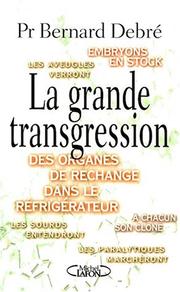
ISBN: 2840986345 9782840986348 Year: 2000 Publisher: Paris Lafon
Abstract | Keywords | Export | Availability | Bookmark
 Loading...
Loading...Choose an application
- Reference Manager
- EndNote
- RefWorks (Direct export to RefWorks)
Human genetics --- 17.023.33 --- 575 --- biomedisch, medisch-wetenschappelijk onderzoek --- biomedische technologie --- verbetergeneeskunde (mensverbetering) --- genetische engineering (manipulatie) --- genetische verbetering (maakbare mens) --- ethiek (ethische aspecten) --- Genetics --- Heredity, Human --- Human biology --- Physical anthropology --- recherche biomédicale --- technologie biomédicale --- médecine de l'amélioration (médecine d'amélioration) --- génie génétique (ingénierie génétique) --- amélioration génétique --- ethique (aspects ethiques)
Book
ISBN: 9780198754855 Year: 2016 Publisher: New York Oxford University Press
Abstract | Keywords | Export | Availability | Bookmark
 Loading...
Loading...Choose an application
- Reference Manager
- EndNote
- RefWorks (Direct export to RefWorks)
Transhumanisme --- Bioéthique --- Biotechnologie --- Philosophie de la technique --- Médecine d'amélioration --- Innovations --- Philosophical anthropology --- Philosophy and psychology of culture --- General ethics --- Bioéthique. --- Biotechnologie. --- Philosophie de la technique. --- Médecine d'amélioration. --- Innovations technologiques. --- verbetergeneeskunde (mensverbetering) --- médecine de l'amélioration (médecine d'amélioration) --- Innovation.
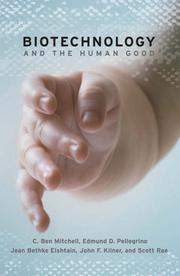
ISBN: 1589011384 9781589011380 Year: 2007 Publisher: Washington Georgetown university press
Abstract | Keywords | Export | Availability | Bookmark
 Loading...
Loading...Choose an application
- Reference Manager
- EndNote
- RefWorks (Direct export to RefWorks)
Outcry over recent developments in the reproductive and genetic sciences has revealed deep fissures in society's perception of biotechnical progress. Many are concerned that reckless technological development, driven by consumerist impulses and greedy entrepreneurialism, has the potential to radically shift the human condition - and not for the greater good. Biotechnology and the Human Good builds a case for a stewardship deeply rooted in Judeo-Christian theism to responsibly interpret and assess new technologies in a way that answers this concern. The authors argue that to question and critique how fields like cybernetics, nanotechnology, and genetics might affect our future is not antiscience, anti-industry, or antiprogress, but rather a way to promote human flourishing and the human good.
Biotechnology --- Christianity. --- Genetic Engineering --- Medical ethics. --- Values. --- Moral and ethical aspects. --- Ethics. --- Medical ethics --- Values --- biotechnologie --- verbetergeneeskunde (mensverbetering) --- waardigheid van de mens --- Axiology --- Worth --- Aesthetics --- Knowledge, Theory of --- Metaphysics --- Psychology --- Ethics --- Biomedical ethics --- Clinical ethics --- Ethics, Medical --- Health care ethics --- Medical care --- Medicine --- Bioethics --- Professional ethics --- Nursing ethics --- Social medicine --- Moral and ethical aspects --- médecine de l'amélioration (médecine d'amélioration) --- dignité humaine
Book
ISBN: 9781402088513 9781402088520 1402088515 9789048180059 Year: 2008 Publisher: S.l. Springer
Abstract | Keywords | Export | Availability | Bookmark
 Loading...
Loading...Choose an application
- Reference Manager
- EndNote
- RefWorks (Direct export to RefWorks)
As we are increasingly using new technologies to change ourselves beyond therapy and in accordance with our own desires, understanding the challenges of human enhancement has become one of the most urgent topics of the current age. This volume contributes to such an understanding by critically examining the pros and cons of our growing ability to shape human nature through technological advancements. The authors undertake careful analyses of decisive questions that will confront society as enhancement interventions using bio-, info-, neuro- and nanotechnologies become widespread in the years to come. They provide the reader with the conceptual tools necessary to address such questions fruitfully. What makes the book especially attractive is the combination of conceptual, historical and ethical approaches, which makes it highly original. In addition, the well-balanced structure of the volume allows both favourable and critical views to be voiced. Moreover, the work has a crystal clear structure. As a consequence, the book is accessible to a broad academic audience. The issues raised are of interest to a wide reflective public concerned about science and ethics, as well as to students, academics and professionals in areas such as philosophy, applied ethics, bioethics, medicine and health management.
bio-ethiek (medische, biomedische ethiek, bio-ethische aspecten) --- verbetergeneeskunde (mensverbetering) --- transhumanisme (cyborg) --- posthumanisme --- geschiedenis (historische aspecten) --- ethiek (ethische aspecten) --- filosofie (filosofische aspecten) --- bioéthique (éthique médicale, biomédicale, aspects bioéthiques) --- médecine de l'amélioration (médecine d'amélioration) --- transhumanisme --- histoire (aspects historiques) --- ethique (aspects ethiques) --- philosophie (aspects philosophiques) --- Social ethics --- Medical law --- Medical innovations. --- Medical ethics.
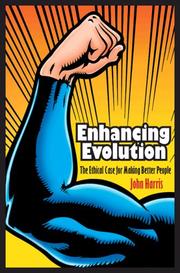
ISBN: 9780691128443 0691128448 Year: 2007 Publisher: Princeton, N.J. Princeton University Press
Abstract | Keywords | Export | Availability | Bookmark
 Loading...
Loading...Choose an application
- Reference Manager
- EndNote
- RefWorks (Direct export to RefWorks)
Professional ethics. Deontology --- Evolution --- Biotechnology --- Genetic engineering --- Bioethics --- Biotechnologie --- Génie génétique --- Bioéthique --- Genetic aspects --- Aspect génétique --- Human reproductive technology --- Moral and ethical aspects --- Moral and ethical aspects. --- biomedische technologie --- ethiek (ethische aspecten) --- verbetergeneeskunde (mensverbetering) --- 600.2 --- bio-ethiek --- erfelijkheidsleer --- eugenetica --- genetische manipulatie --- medische ethiek --- 170 --- technologie biomédicale --- ethique (aspects ethiques) --- médecine de l'amélioration (médecine d'amélioration) --- Erfelijkheidsleer --- Ethiek --- Génie génétique --- Bioéthique --- Aspect génétique --- Human reproductive technology - Moral and ethical aspects --- Genetic engineering - Moral and ethical aspects
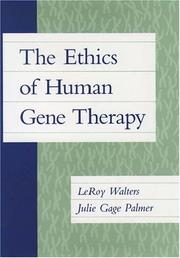
ISBN: 0195059557 9780195059557 Year: 1997 Publisher: New York Oxford university press
Abstract | Keywords | Export | Availability | Bookmark
 Loading...
Loading...Choose an application
- Reference Manager
- EndNote
- RefWorks (Direct export to RefWorks)
The authors of this absorbing new book describe the science of gene therapy in terms easily accessible to the non-specialist, and focus on the controversial ethical and public policy issues surrounding human interventions in human heredity. After a brief survey of the structure and functions of DNA, genes, and cells, Walters and Palmer discuss three major types of potential genetic intervention: somatic cell gene therapy, germ line gene therapy, and genetic enhancements. They start with the current techniques of gene addition, using non-reproductive (somatic) cells in an effort to cure or treat disease. Next they address the technical problems and moral issues facing attempts to prevent disease through genetically modifying early human embryos or sperm and egg cells. These changes would be passed on to future generations. Chapter 4, in many ways the most original part of this volume, confronts the issue of employing genetic means to improve human abilities and appearance. Depending on the technique, such enhancements could affect not only the individuals receiving the intervention but their offspring as well. Three types of genetic enhancements are considered: physical alterations to improve size, reduce the need for sleep, and decelerate aging; intellectual enhancements of memory and general cognitive ability; and moral enhancements for control of violently aggressive behavior. The authors maintain that genetic modifications should be evaluated individually rather than be condemned in principle or as a group. The final chapter summarizes the public review process that human gene therapy proposals have been undergoing in the United States since 1990. Five appendices, providing technical background information along with a complete list of questions raised in the national public review process, supplement the discussion.
Professional ethics. Deontology --- Human medicine --- #GBIB:CBMER --- gentherapie --- verbetergeneeskunde (mensverbetering) --- genetische engineering (manipulatie, gentechnologie) --- somatische gentherapie --- kiemcel (kiemcellijn, embryonale kiemcel, germinale stamcel) --- thérapie génique --- médecine de l'amélioration (médecine d'amélioration) --- génie génétique (ingénierie, manipulation génétique) --- thérapie génique somatique --- cellule germinale (lignée germinale, cellule embryonnaire germinale, cellule souche germinale) --- Gene therapy --- Moral and ethical aspects. --- Moral and ethical aspects --- Therapy, Gene --- Genetic engineering --- Therapeutics --- Gene therapy - Moral and ethical aspects
Book
ISBN: 9780199671496 9780199587810 0199587817 0191728764 0199671494 0191651621 1283692023 Year: 2011 Publisher: Oxford Oxford University Press
Abstract | Keywords | Export | Availability | Bookmark
 Loading...
Loading...Choose an application
- Reference Manager
- EndNote
- RefWorks (Direct export to RefWorks)
Biotechnologies enable us to be smarter, have better memories be stronger and quicker, live longer, be more resistant to diseases, and enjoy richer emotional lives. Buchanan explores urgent ethical issues raised by these developments, about what it is to be human and what sort of society we should strive to have.
Medical innovations --- Moral and ethical aspects. --- biomedisch, medisch-wetenschappelijk onderzoek --- biomedische technologie --- menselijke natuur --- verbetergeneeskunde (mensverbetering) --- rechtvaardigheid (rechtvaardigheidsprincipe, distributieve rechtvaardigheid) --- ethiek (ethische aspecten) --- recherche biomédicale --- technologie biomédicale --- nature humaine --- médecine de l'amélioration (médecine d'amélioration) --- justice (principe de justice, justice distributive, justice sociale) --- ethique (aspects ethiques) --- Biomedical Enhancement --- Innovations, Medical --- Medicine --- Medical technology --- Technological innovations --- Moral and ethical aspects --- Innovations --- Medical law --- Professional ethics. Deontology --- Médecine --- Aspect moral --- ethics. --- Medical innovations - Moral and ethical aspects.
| Listing 1 - 10 of 21 | << page >> |
Sort by
|

 Search
Search Feedback
Feedback About UniCat
About UniCat  Help
Help News
News